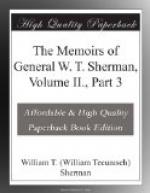Nearly all the people of the country seemed to have fled with Johnston’s army; yet some few families remained, and from one of them I procured the copy of an order which Johnston had made at Adairsville, in which he recited that he had retreated as far as strategy required, and that his army must be prepared for battle at Cassville. The newspapers of the South, many of which we found, were also loud in denunciation of Johnston’s falling back before us without a serious battle, simply resisting by his skirmish-lines and by his rear-guard. But his friends proclaimed that it was all strategic; that he was deliberately drawing us farther and farther into the meshes, farther and farther away from our base of supplies, and that in due season he would not only halt for battle, but assume the bold offensive. Of course it was to my interest to bring him to battle as soon as possible, when our numerical superiority was at the greatest; for he was picking up his detachments as he fell back, whereas I was compelled to make similar and stronger detachments to repair the railroads as we advanced, and to guard them. I found at Cassville many evidences of preparation for a grand battle, among them a long line of fresh intrenchments on the hill beyond the town, extending nearly three miles to the south, embracing the railroad-crossing. I was also convinced that the whole of Polk’s corps had joined Johnston from Mississippi, and that he had in hand three full corps, viz., Hood’s, Polk’s, and Hardee’s, numbering about sixty thousand men, and could not then imagine why he had declined battle, and did not learn the real reason till after the war was over, and then from General Johnston himself.




